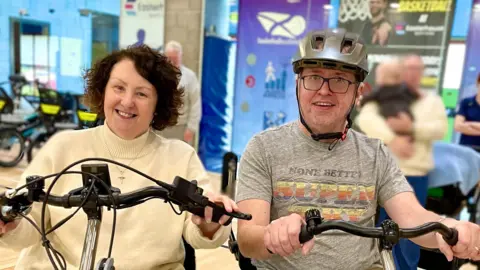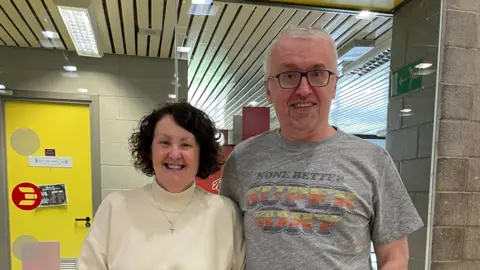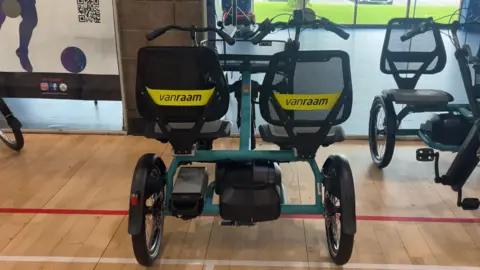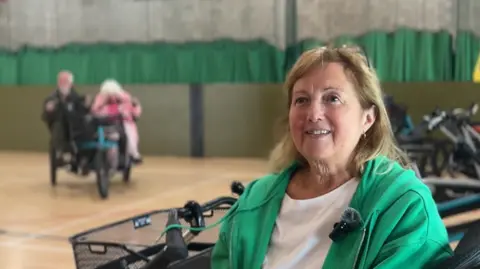'Parkinson's cycling club has given me back my independence'
 Easterhouse Phoenix
Easterhouse PhoenixTony Deeney was diagnosed with Parkinson's at just 38 and the degenerative condition gradually left feeling isolated and with little enthusiasm for life.
But after two decades struggling with the condition, he says cycling has helped him rediscover a sense of independence.
Tony says he first knew something was wrong when he struggled to strum a tune on his guitar.
He was a keen guitarist but suddenly his fingers would not move to find the different notes.
Soon after, the father of two young children was diagnosed with Parkinson's, a condition in which parts of the brain become progressively damaged over many years.
It can cause tremors, balance problems and slow movement.
Tony was told he might only have between five and eight "good" years left before his symptoms would worsen.
In the end, with advancements in medication and support from his colleagues, it was 11 years before Tony had to retire from his job as a physics teacher.
 Easterhouse Phoenix
Easterhouse PhoenixIt was when he retired that he noticed a drop in his enjoyment for life.
"It's the dark side of Parkinson's," Teresa says.
"There is a loss that is almost depressive."
Tony, who can now only manage a few words, calls it "apathy".
He would often stay in the house watching television and sometimes couldn't be bothered to shower.
The couple say Parkinson's can be isolating because of the way symptoms present themselves.
It was almost 10 years after his retirement that Tony discovered the benefits of exercise for people with Parkinson's.
"It became a real game-changer for him," Teresa says.
He started playing table tennis as well as "walking football", aimed at Parkinson's suffers.
It was when he tried chair yoga that a friend encouraged him to attend a cycling club.
'Transformative is an understatement'
Tony was apprehensive and almost refused to go but Teresa convinced him to try it.
"To say it was transformative is an understatement," she says.
She says she was close to tears when Tony's face lit up during his first class.
"From day one, the joy and freedom he has experienced has been life-changing for him - he can cycle on his own," she says.
"This cycling club has given Tony his independence back."
Tony agrees that the club has given him a "sense of independence" but he says he still has to rely on his wife.
Teresa says Tony's confidence has improved because it is something he is able to do on his own. He's now even got his own scooter.
"It's opened up the outside world for him again," Teresa says.
"We went for a walk and he was in [the scooter]. I can't remember the last time we did that."
"It's such an ordinary thing that people take for granted and don't even notice, but for us, that's major."

Community and support
The Parkinson's Cycling sessions are run twice a month by the Phoenix Community Centre in Easterhouse, on the outskirts of Glasgow.
They use specially designed tricycles for people with a disability made by the Dutch company Van Raam.
Some of their features include power assisted cycling, a moving chair for accessibility and dual control so that someone can cycle with a partner.
The Phoenix Centre also has a pop up café at the side of the sports hall to encourage connection and community.
Director Caroline Cumming says: "Even if you only wanted to have a short cycle. You can sit down have a chat, have a cup of tea or a coffee."
"You don't even have to cycle."
Teresa and Tony said maintaining a connection was very important for people with Parkinson's.
They say groups for people with the disease help to ease their worry because they don't have to explain why they struggle to speak or walk.
Teresa says that everyone supports each other and create a positive space.

Exercise as medicine
Parkinson's symptoms arise after substantial loss of the dopamine-producing cells in an area of the brain known as the substantia nigra.
Amanda Mckay, from Parkinson's UK, said that there are over 40 different types of symptoms and "no two people are the same."
As people live longer with the condition, symptoms can become more aggressive and debilitating – which can impact mobility and stability significantly.
Ms McKay says: "I think the key is to encourage people with Parkinson's to be active, that's a prescription in itself."
She says it is important for people to find something they enjoy doing because then they are likely to do it more often.
Physiotherapist lecturer David Hegarty says exercise has similar benefits to medicine for Parkinson's patients without the side effects.
People build stronger muscles and better cardiovascular fitness, which in turn reduces symptoms, he says.
And Teresa Deeney agrees.
"The independence, joy and fitness it gives my husband is a tonic to his health and mental wellbeing," she says.
